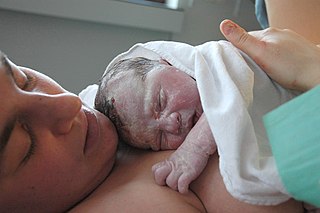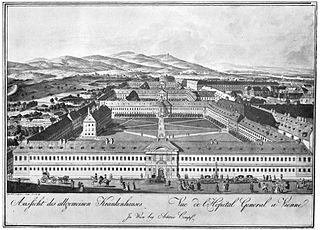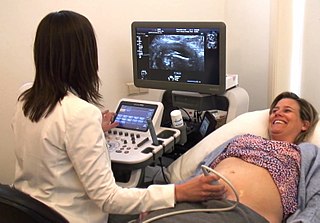
Midwifery is the health science and health profession that deals with pregnancy, childbirth, and the postpartum period, in addition to the sexual and reproductive health of women throughout their lives. In many countries, midwifery is a medical profession. A professional in midwifery is known as a midwife.
Obstetrics is the field of study concentrated on pregnancy, childbirth and the postpartum period. As a medical specialty, obstetrics is combined with gynecology under the discipline known as obstetrics and gynecology (OB/GYN), which is a surgical field.

Childbirth, also known as labour, parturition and delivery, is the completion of pregnancy where one or more babies exits the internal environment of the mother via vaginal delivery or caesarean section. In 2019, there were about 140.11 million births globally. In the developed countries, most deliveries occur in hospitals, while in the developing countries most are home births.
A birthing center is a healthcare facility, staffed by nurse midwives, midwives and/or obstetricians, for mothers in labor, who may be assisted by doulas and coaches. The midwives monitor the labor, and well-being of the mother and the baby during birth. Doulas can assist the midwives and make the birth easier. Should additional medical assistance be required, the mother can be transferred to a hospital. This transfer is more likely if an epidural is needed, there is meconium staining, it is a prolonged labor, or the newborn needs intensive care. Some hospitals have birth centers as an alternative to the usual high tech maternity wards.

The postpartum period begins after childbirth and is typically considered to end within six weeks. However, there are three distinct but continuous phases of the postnatal period; the acute phase, lasting for six to twelve hours after birth; the subacute phase, lasting six weeks; and the delayed phase, lasting up to six months. During the delayed phase, some changes to the genitourinary system take much longer to resolve and may result in conditions such as urinary incontinence. The World Health Organization (WHO) describes the postnatal period as the most critical and yet the most neglected phase in the lives of mothers and babies; most maternal and newborn deaths occur during this period.

A home birth is a birth that takes place in a residence rather than in a hospital or a birthing center. They may be attended by a midwife, or lay attendant with experience in managing home births. Home birth was, until the advent of modern medicine, the de facto method of delivery. The term was coined in the middle of the 19th century as births began to take place in hospitals.
Natural childbirth is childbirth without routine medical interventions, particularly anesthesia. Natural childbirth arose in opposition to the techno-medical model of childbirth that has recently gained popularity in industrialized societies. Natural childbirth attempts to minimize medical intervention, particularly the use of anesthetic medications and surgical interventions such as episiotomies, forceps and ventouse deliveries and caesarean sections. Natural childbirth may occur during a physician or midwife attended hospital birth, a midwife attended homebirth, or an unassisted birth. The term "natural childbirth" was coined by obstetrician Grantly Dick-Read upon publication of his book Natural Childbirth in the 1930s, which was followed by the 1942 Childbirth Without Fear.

William Smellie was a Scottish obstetrician and medical instructor who practiced and taught primarily in London. One of the first prominent male midwives in Britain, he designed an improved version of the obstetrical forceps, established safer delivery practices, and through his teaching and writing helped make obstetrics more scientifically based. He is often called the "father of British midwifery".

Unassisted childbirth (UC) refers to the process of intentionally giving birth without the assistance of a medical birth attendant. It may also be known as freebirth, DIY (do-it-yourself) birth, unhindered birth, and unassisted home birth. Unassisted childbirth is by definition a planned process, and is thus distinct from unassisted birth due to reasons of emergency, lack of access to a skilled birth attendant, or other. It is also different from homebirth, although most UCs also happen within the home.

Historically, puerperal fever was a devastating disease. It affected women within the first three days after childbirth and progressed rapidly, causing acute symptoms of severe abdominal pain, fever and debility.
The Society of Obstetricians and Gynaecologists of Canada (SOGC) is a national medical society in Canada, representing over 4,000 obstetricians/gynaecologists, family physicians, nurses, midwives, and allied health professionals in the field of sexual reproductive health.
The following outline is provided as an overview of and topical guide to obstetrics:
Doris Clifton Gordon was a New Zealand doctor, university lecturer, obstetrician and women's health reformer. She was known as 'Dr Doris', famous for her work in rural general practice, for raising the status of obstetrics, improving obstetrics education of medical students and doctors, and working for the welfare of mothers and children.

The National Maternity Hospital, popularly known as Holles Street Hospital, is a large maternity hospital in Ireland. It is at the eastern corner of Merrion Square, at its junction with Holles Street and Lower Mount Street in Dublin. It is managed by Ireland East Hospital Group.

Joseph Bolivar DeLee was an American physician who became known as the father of modern obstetrics. DeLee founded the Chicago Lying-in Hospital, where he introduced the first portable infant incubator. Early in his career, he was associated with the medical school at Northwestern University. After 1929, he was employed by the medical school at the University of Chicago.

A midwife is a health professional who cares for mothers and newborns around childbirth, a specialization known as midwifery.
Charlotte Douglas OBE FRCOG was a Scottish obstetrician and gynaecologist. She was a senior regional account manager for North of England, senior medical officer for Scotland and campaigner for the progressive improvement of maternity services in Scotland.

Charles Richard Whitfield FRCOG, FRCP(G) was a Northern Irish obstetrician and gynaecologist who was a pioneer of maternal-fetal (perinatal) medicine. His primary interest was in fetal medicine, a branch of obstetrics and gynaecology that focuses on the assessment of the development, growth and health of the baby in the womb. He was also an early proponent of subspecialisation within the fields of obstetrics and gynaecology, a practice that is common today.
Bosede Bukola Afolabi is a UK-born Nigerian Gynaecologist, Professor, and Head of the Department of Obstetrics and Gynaecology at the College of Medicine, Lagos University Teaching Hospital, Lagos, Nigeria. She is also the founder and chairperson of MRH Research Collective, a research and training NGO.

Beverley Ann Lawrence Beech was a Welsh author, chair of the Association for Improvements in the Maternity Services (AIMS) from 1977 to 2017 and an active campaigner against the medicalisation of pregnancy and birth. She raised awareness of the harm that can be done to women in obstetrics during labour and the importance of women being aware of their rights so they can make their own decisions about the place and manner of the birth of their children. She also counselled for a more positive attitude towards home births.












